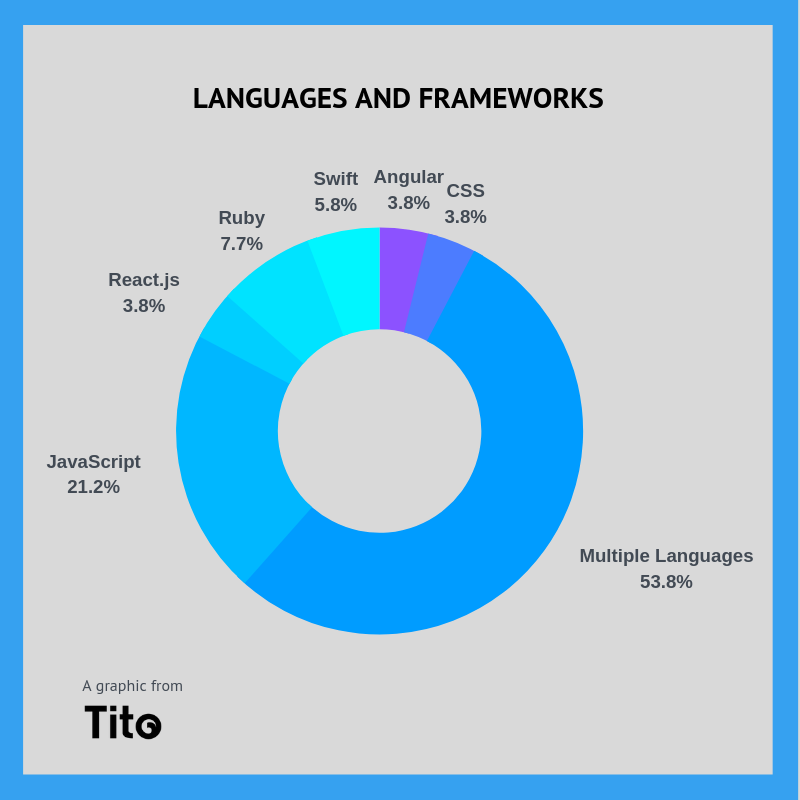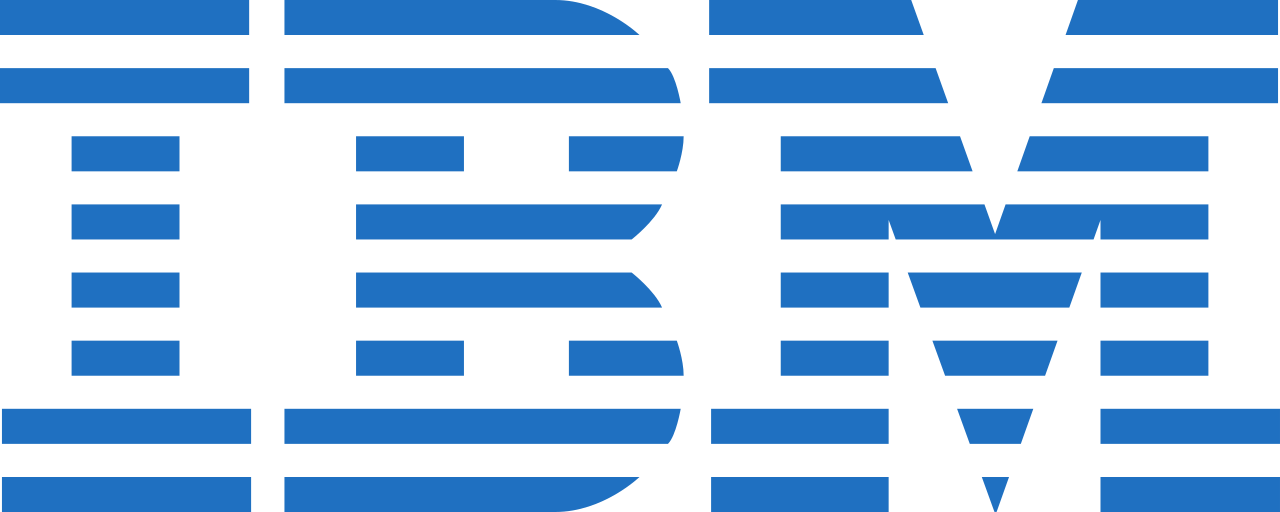
15 Organizations That Sponsor Developer Events
The calendars of people in events are anything but average, but January remains a universal time to refocus, prioritise, and not panic.
If you’re the no-nonsense type and want to get straight to the results, here are the top 5 organizations that sponsor developer events:
- Google; They sponsored 30% of the sample set of developer events.
- Microsoft; They sponsored 27% of the sample set of developer events.
- Jet Brains; They sponsored 15% of the sample set of developer events.
- Twilio; They sponsored 15% of the sample set of developer events.
- IBM; They sponsored 13% of the sample set of developer events.
One of the main pressure points when an event is coming up is figuring out how to fund it. Of course, ticket sales can sustain some events in their entirety, but many organisers look to sponsorship to bridge the gap between expenses and money in the bank.
However, it can be hard to find who you should reach out to with your sponsorship proposals and pitches. So, this blog post was born.
We thought it’d be interesting to take a sample of developer events specifically, and to analyse the sponsors who were most frequently involved across that set. That data would potentially help a lot of people organising developer conferences (or meet-ups, etc) by giving them a starting point, and an overview of willing sponsor organisations.
With that, we’ve identified 15 companies that popped up time and again. To see the companies featured the full list, simply read on:
(We also released our analysis of sponsors that frequently get involved with design events in 2018. You can access that here. We’ve tripled the featured companies in this post though, in the spirit of self-improvement.)
The Sample
For this experiment, we first needed to find a lot of developer events to look into. Thankfully, at Tito, we’ve been working with this kinds of events for some years now, meaning we knew of a lot of conferences in the developer space to look at.
In total, we analysed some 59 developer conferences. Among them, we found a whopping 574 unique sponsors.
In terms of the types of developer conferences analysed, we aimed to include a variety of disciplines within the realm of development. This meant finding samples that focus on different languages and frameworks, as well as a lot that ran conferences and events that had multiple tracks and thus multiple sessions on multiple variations of those.
To see what proportion of your preferred means of work made up this analysis, you can see the break down in this handy pie chart:

Another factor that may be relevant to how you look at the sponsor numbers that follow is where the events were held.
With a view to taking a large mixture again, we endeavoured to cover a lot of physical ground.
Here are the seven countries that came up on the list the most often:
.png)
As well as these, we took events from Austria, Canada, China, Czechia, Estonia, Japan, the Netherlands, Pakistan, Singapore, and Switzerland into account, just not in the same quantities.
The Concerns
Looking at the number of sponsors versus the number of events, there was a level of concern attached that there wouldn’t be enough overlap to be statistically significant when it came to any sponsors supporting multiple events on the list.
After recording and totting up the names of each of the sponsors, those fears went away as the prevalence of certain sponsor companies became apparent. There were 746 sponsors in the sponsor entries, meaning there had to be at least some duplicates.
The Results
There were five standouts among the sponsoring companies who kept coming up. Namely, they were Google, Microsoft, Jet Brains, Twilio, and IBM. The percentage breakdown of how many events they sponsored can be seen in the figure below.
.png)
Google topped the charts by sponsoring 30% of the developer events, Microsoft covered 27%, Jet Brains and Twilio each sponsored 15%, and IBM made the cut by featuring on just over 13% of the analysed sponsor lists.
Here’s a quick breakdown of what each of those companies does, and some info on their sponsorship (where available).
1) Google
You probably either got here via Google, or used it at least once today. The search engine, that is, at least. Google has sharply become so multi-faceted that it’s quite hard to define in a sentence at this stage. Google has properties across multiple disciplines including, but not limited to, Gmail, Google Maps, and YouTube.

Image Source and Copyright: Google.
I wasn’t surprised to find them top of the list at first, until I started looking around in a bid to find the application process they have in place for hopeful event organisers seeking sponsorship.
The first thing you find, as defined by their own algorithm is that their Brand Permissions department can’t help you.
After some subsequent digging, I found a few possible routes for applying, or at least asking Google to point you in the right direction. These ranged from getting into a Twitter conversation with a local Googler (albeit in 2008) to becoming a full-blown Google partner.
The most sensible option, it seems, is to follow the advice on their Permissions page which reads, “If you’re working with someone at Google, please connect with them to have any sponsorship requests handled.”
What I mean by this is that sponsorship is usually handled by a specific team or individual for specific regions at a multi-national of Google’s scale. Try identifying who this is for your region or country via LinkedIn and reaching out there. Social Tables have some great tips available on their blog around how to initiate the process of pitching your event for sponsorship and what to include.
If you happen to be running non-profit developer events, you can check to see if you are eligible for Google for Non-Profits too, if you’re so inclined.
2) Microsoft
Microsoft makes the very software I’m typing this on, and many other things. Like Google, Microsoft is also American, also a multi-national, and also really into sponsoring developer events, going by our numbers.

Image Source and Copyright: Microsoft.
Microsoft makes everything from laptops to slideshow software, though I’m sure you’re already probably aware of that.
When it comes to sponsorship, their accessibility is as cryptic as Google’s, in that there’s no available, formal process for application. In that sense, researching the regional head of sponsorship or partner marketing is your best bet.
In terms of getting your collateral ready for the nerve-wracking hit-send moment, you could do a lot worse than taking a look at what Microsoft themselves put into their events prospectuses. This document shows what they think sponsors want. And, as a ready and willing sponsor in the past themselves, what they probably expect.
As with Google, Microsoft also have a non-profit avenue that you can explore.
3) Jet Brains
Less of a household name than the first two companies on our list, Jet Brains was a new brand to me before this experiment.
Jet Brains makes developer tools. They’ve done so for over 15 years, in fact. With 720 employees, 5 million+ users, and operations in 169 countries, I felt an overwhelming sense that I’d had my head in the sand when it came to this company when I found out about it.
HQ’d in Prague, Czechia, Jet Brains have worked with notable companies such as Salesforce and The New York Times, but they’ve sponsored even more that run events.

Image Source and Copyright: Jet Brains.
Finally! A form to fill in!
– Looking up the Jet Brains website was the first time I’ve ever said this.
On their site, you can find an easy-to-complete form where you can outline your pitch and suitability as a sponsorship candidate.
They need to know key details such as your main audience and main technology focus, but after that all your need is your pitch, contact details, and any additional flare and personality you’d like to inject.
4) Twilio
Twilio is a developer platform for communications. With Twilio, you can add communications to your applications, including — but not limited to — voice, video, and messaging.
Twilio has worked with the likes of Dell, Twitter, and Hulu by providing their core offering as outlined above, and has sponsored just over 15% of the developer events we analysed.

Image Source and Copyright: Twilio.
In their 2017 (and 2018 proxy update) Annual Report, Twilio committed to continue sponsoring additional events, meaning that the trend isn’t likely to stop any time soon.
There is no formal process for applying for sponsorship from Twilio as far as we’ve found, so it might be useful to explore more traditional avenues when it comes to approaching the team with sponsorship enquiries.
As with a lot of the companies we have and will discuss, Twilio offers incentives and discounts for non-profit associations.
5) IBM
Another one of those “how do you describe a huge enterprise in ten words or less?” conundrums. IBM make everything from the scoreboards at Wimbledon to server hardware, and most things in between, of which there is an abundance.

Image Source and Copyright: IBM.
According to one IBM resource, “the overwhelming majority of grants are initiated by IBM, do not stem from unsolicited proposals, and involve multi-year commitments.” This may be a bit too much too soon for some smaller developer conferences, though the approach may prove lucrative if the commitment is something you’re striving for.
Again, given this cautionary quote, it seems logical that there’s no formal process by which IBM wish to be approached, but traditional communications may, again, be a runner if you’re still eager to throw your hat in the ring.
Similar to the advice I gave regarding taking Microsoft’s own sponsorship pitch into account if you’re reaching out cold to IBM, you might consider their proposal style and contents here.
Where are the other 10?
Yes, dear reader, I’ve promised you 15, and intend on delivering on that promise. I just wanted to show off the heavy hitters first.
Though only four of the following companies made it into double digits when it came to the percentage of the sample events they sponsored, they certainly merit a notable mention:
6) GitHub
GitHub is where all the code lives.
– My layman’s term depiction of a multi-million dollar business.
GitHub is the world’s leading software development platform, loved by millions of engineering teams around the world.
More than 2.1 million businesses use GitHub, one of which is NASA. As well as supporting the community via their tools, GitHub came up a lot when we were going through our list of events.
Key Facts:
- They sponsored 12% of the events on our list.
- Employees: 1,000+.
- Formal sponsorship application process?: No.
- Their sponsorship proposal (for inspiration): Here.
7) Capital One
Capital One is an American bank holding company based in Virginia. It’s ranked 10th in the US in terms of largest banks by assets.
After six tech-heavy listings, I was surprised to see a bank land in the middle of the companies providing this kind of sponsorship, so I dug a little deeper as to how they fit into the tech space.
One, they seem to have many highly engaged engineers already on their team. Two, they have a robust development API that encourages engineers to build Cap One functionality into their environments. Both of these factors highlight a commitment to development at the organisation, and it seems only sensible that they see this as a growth avenue for the organisation in years to come.
Key Facts:
- They sponsored just over 10% of the events we analysed.
- Employees: Just over 49,000.
- Formal sponsorship application process?: No.
- Alternative sponsorship process: Their media relations information is available here.
7) Facebook
Facebook is a social media platform that lots of people love and lots of other people love to hate.
Mark Zuckerberg’s brain child has gone from strength to controversy in recent times for a variety of reasons.
However, in Q3 2018, they were still boasting some 2.27 billion active users, meaning that the populous is far from being fully dissuaded from using the platform, in spite of any scandal.
According to our research, Facebook played a key role in sponsoring several of the events we analysed. Facebook has a strong developer community, hosting its own meet-ups and developer conference (F8), building developer circles, and providing video assets from various events that they host on their developer portal for easy access.
Key Facts:
- They sponsored just over 10% of the events we took as our sample.
- Employees: Just over 25,000.
- Formal sponsorship application process?: No.
- Alternative sponsorship process: If you’re a start-up, Facebook’s FbStart programme may be a way to get support for your developer events.
7) Mozilla
Mozilla make the Firefox web browser and other cool open-source things. They’re a not-for-profit organisation dedicated to keeping the internet healthy for everyone.
Sandra Persing, their global strategist for developer outreach, outlined the key strategies that Mozilla uses to choose which developer conferences to sponsor and what to focus on when they host their own at our latest conference, Admission. You can sign up here to be emailed the video recording of that talk when we release it in the coming weeks.
Key facts:
- They sponsored just over 10% of the events we analysed.
- Employees: 1,000+.
- Formal sponsorship application process?: Yes. Indeed.
10) Balsamiq
Balsamiq makes wireframing technology for online designers. They’ve been around since 2008 and strive to make UI design accessible.
On their website, they feature sponsorship as a key tenet of their community support. The ethos behind supporting events that they choose is the aim to “rid the world of bad software.”
They want the events they sponsor to continue to be as successful as possible; it’s as simple as that. As you might have guessed from their product offering, they’re also passionate about sponsoring design events, as evidenced by our post from last year.
Key facts:
- They sponsored just over 8% of the events we looked into.
- Employees: Just over 30.
- Formal sponsorship application process?: Yes.
11) Couchbase
Couchbase is a NoSQL database for business-critical applications. A NoSQL database provides a mechanism for storage and retrieval of data that is modeled in means other than the tabular relations used in relational databases.
More traditional databases tend to be slower than NoSQL ones because they don’t have to adhere to the same requirements traditional databases have like indexing and pre-processing queries. Couchbase is used by companies like PayPal, Sky, and Verizon.
In terms of developer event sponsorship, there’s no clear path to applying, but they do list the events they sponsor on this page to give you a feel of whether or not your event matches the events they look for.
Key facts:
- They sponsored just over 8% of the sample events.
- Employees: Just over 400.
- Formal sponsorship application process?: No.
- Alternative sponsorship application: Read their prospectus to see what they expect in a proposal here.
11) Datadog
Datadog is a monitoring and analytics platform with one of the cutest company logos of all time. According to their site, “Datadog seamlessly aggregates metrics and events across the full devops stack.” Their blog is also pretty beautiful.
Datadog hosts Dash and community summits, meaning they know a thing or two about what goes into a successful event.
Key facts:
- They sponsored just over 8% of the events we analysed.
- Employees: 900+.
- Formal sponsorship application process?: No.
- Alternative sponsorship application process: Datadog runs a dedicated partner program, one benefit of which is strategic co-marketing. If your organisation is a user, or thinking about becoming a user, this may be a path you ought to explore if you’re looking at your long term strategy.
11) MongoDB
MongoDB is probably an open-source document database “for giant ideas”. It stores data in flexible JSON-like documents and works with companies like Adobe, Amazon, and MetLife.
As well as being free to use, MongoDB provides myriad resources to learn about the offering and how implementing it can be of benefit to your business.
In addition to their sponsorship of developer events, they also provide diversity scholarships to their own events in a bid to help break down the barriers facing underrepresented groups in technology which can often prevent them from attending conferences and events that could benefit their career.
Key facts:
- MongoDB sponsored just over 8% of the events we took into account for this research.
- Employees: Over 1,000.
- Formal sponsorship application process?: No.
- Alternative application process: As with Datadog, MongoDB offers a partner program option with several tiers. You can read up about some specifics here and here.
11) Nexmo
Nexmo provide APIs for SMS, voice, and phone verifications. They frame their purpose as giving users the ability to “create innovative and delightful customer experiences with programmable communication building blocks.” They also provide solutions for online messaging and video.
They list the events they’ll be attending throughout the year on their community page. They also have an enthusiastic and robust developer relations team to help with the management involved with a growing community like this. They also chronicle their experiences at events on their blog.
Key facts:
- Nexmo, again, sponsored ~8% of the events we took into account.
- Employees: Approximately 380.
- Formal sponsorship application process?: No.
- Alternative application process: Traditional routes (as outlined earlier in this post) are your best avenue to pursue here.
11) Opendoor
Opendoor is another of the companies on this list that you wouldn’t automatically think of as a good fit for sponsoring a developer event. Opendoor aims to simplify the processes involved in buying and selling a house much to the appreciation of anyone who’s ever gone through either rigmarole, I’d assume.
They achieve this for sellers by compiling data about what offers should be made by using up-to-date market analysis as performed by the experts on the team. Then, the customer reviews the offer, and Opendoor carries out an inspection of the property to identify any repairs that need to be done. Following that, the customer sells the house gets paid.
For buyers, they can tailor viewings around their schedule using the Opendoor app and can then get a guide to placing an offer. There’s also a 30-day satisfaction guarantee with properties.
Key facts:
- Opendoor sponsored ~8% of the events we looked into.
- Employees: Almost 1,000.
- Formal sponsorship application process?: No.
- Alternative sponsorship application process: There doesn’t seem to be much (read: any) information available online about sponsorship opportunities with Opendoor. Traditional outreach is advisable.
Also tying for 11th place in this line-up were Oracle, RedHat, Stickermule, and VMWare, but I didn’t want to overload the list.
The Extra Bonus Takeaways
While researching for this post, I came across a few tidbits that I thought might come in handy during your event sponsorship explorations.
SponsorPitch
I came across SponsorPitch, a connecting agency for sponsors and those who want to be sponsored. There, I found that they provide timelines for large companies detailing what deals they get into, and when, as they become public. Here are the pages for Google and Microsoft respectively, the first three results for which you can see for free, to get an eye on the potential competition.
According to Forbes, the “start-up has amassed a data set of nearly 80,000 sponsorship deals from the world’s top sponsorship spenders, data that it makes available to a network of close to 30,000 SponsorPitch members,” and it seems to be a growth market.
Useful Resources About Sponsorship Application and Tactics
- Shopify have a great resource available here which outlines what companies should (and do) do when they’re identifying events they want to sponsor. Make sure your offering and pitch is tailored to these specs to ensure you’re optimising your chances to stand out to people looking for opportunities.
- EventMB has put together 117 ideas to inspire your sponsorship strategy.
- Sam Basu has outlined a huge collection of sources for tech event funding here.
- We interviewed Red Badger and JSConf to get their insights into what worked for them in the past when they were hoping to secure sponsors.
Disclaimer: The rights to all logos featured in this post are fully held by their respective companies. All data in this post is correct as of January 14th, 2019 for the latest edition of the analysed hosts’ events. We endeavour to update data such as this for accuracy as often as possible.